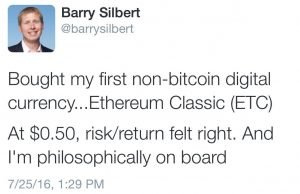
The cryptocurrency community has been reeling from the Ethereum hard fork as the Ethereum Classic (ETC) token has gained momentum with mining, users and major exchanges enabling its trading. Meanwhile, Ethereum founder Vitalik Buterin believes that interest in this minority chain token is “actually coming from the Bitcoin side.”
Hard Fork, Resignations & Possible Lawsuit
1*nIUazw_u3KChCX89fLgLDgBoth cryptocurrency exchanges Kraken and BitFinex have announced they will be supporting ETC trading and pre-fork ETH holders are waiting for GDAX to allow withdrawals. Of course, since the exchange Poloniex started allowing ETC trading within their platform, the entire cryptocurrency community had something to say about the minority chain. Some have shown strong support for ETC, while others like reporter David Seaman have called the token a scam. Others have just shrugged off the madness with jokes.

After 24 hours of trading, ETC was up over 350% higher than the day before at one point on July 26 but as of press time the cryptocurrency is down 25% in value. Lots of people took advantage of these moves as volume on Poloniex has been at over 100K BTC.
Accusations Fly
Meanwhile, accusations have been flying around left and right at the Ethereum Foundation and members of the Slock.it team, most notably Stephan Tual. One particular blog post making its rounds throughout social media came from the Ethereum accessories manufacturer Bitflikz. The post has called for a civil lawsuit on Swiss soil against the Ethereum Foundation and members of the Slock.it development team. The blog post explains that the Foundation and creators of the third party application — the DAO — have been fraudulent and misled the Ethereum community.

There have also been calls from within the Ethereum community for the resignation of Ethereum founder, Vitalik Buterin, concerning this matter. Bitflikz believes these two groups pushed the community to fork because they were heavily invested in the DAO. The blog post states:
The theft of a USD $1billion dollar blockchain with trading assets, copyright material, websites, logos, Github, development funds and employees was switched with fraudulent software. The Exchanges are now operating order books with cloned software belonging to the original Blockchain. We seek to reinstate new leaders of the foundation and reclaim our $1B USD in assets. The Ethereum Foundation is now in possession of a community asset (ETHF) and it is within our best interests to liquidate this position to extend Genesis ETH funding. As the foundation has become corrupt, they cannot be trusted to make decisions for our benefit, only themselves. The foundation involved themselves with a third party and began colluding to perform a hard fork (or %51 attack) motivated by personal investment decisions.
ETC Interest ‘Actually Coming from the Bitcoin Side’
While spending time at Cornell University, Vitalik Buterin wrote to the Ethereum community concerning this matter. In a post called A Grab Bag of Thoughts on ETC and Forks posted on Reddit by Buterin himself, he argues that “Bitcoin Maximalists” have added fuel to the ETC fire and have been helping the classic chain thrive. Echoing David Seaman, Buterin believes Bitcoin supporters have a lot to do with the situation as he explains:
We can see from several sources (including exchange order books, but also public pronouncements from Barry Silbert et al) that incoming interest into ETC is actually coming from the Bitcoin side even more than it is from the Ethereum side. And this is a core tenet of blockchain pluralism: by leaving open an option to join an alternate system if an individual so chooses, you can satisfy the varying needs of larger groups of people.
Buterin also believes that concerns about moral hazard are “overblown” and even though they had to fork he has been “extremely impressed” with the number of security contract programming projects coming from academia, possibly alluding to Hacking Distributed’s Emin Gün Sire, a Cornell professor from the University’s research workshop. The professor and his colleagues have been some of the most vocal researchers concerning auditing of the DAO and bugs within the Ethereum landscape.

“I am very optimistic that the number of bugs in the code will decrease greatly over the next year,” Buterin adds.
However, he adds that this puts a “larger burden” on language developers, and he doesn’t have the time to help maintain Serpent as much as he would like. He is messing with it for Casper experimentation but welcomes other proposals from the community.
The Music Continues
ETC is still being heavily traded, and support for the minority chain might not let up anytime soon as people are still throwing accusations online. Stephan Tual points to Barry Silbert and Bitcoin developer Greg Maxwell as well for stirring the pot in his latest tweet. While interest in ETC might certainly be driven by Bitcoiners, the debacle can nonetheless prove to be a valuable lesson for the Bitcoin community on why it may or may not be a good idea to implement a hard fork, particularly related to the block size debate.
What do you think about the situation with Ethereum and the hard fork? Let us know in the comments below.
Hi! I am a content-detection robot. This post is to help manual curators; I have NOT flagged you.
Here is similar content:
http://www.altcoinsnews.com/ethereum-creator-interest-in-etc-coming-from-the-bitcoin-side/
NOTE: I cannot tell if you are the author, so ensure you have proper verification in your post (or in a reply to me), for humans to check!
Downvoting a post can decrease pending rewards and make it less visible. Common reasons:
Submit